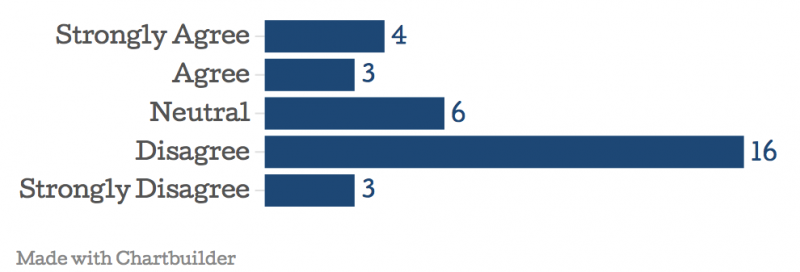Why does China think that they shouldn't follow the western model of democracy?
What would be the problem if China creates an open and public framework to slowly migrate to democracy within, say, 25 years?
Why does China think that they shouldn't follow the western model of democracy?
What would be the problem if China creates an open and public framework to slowly migrate to democracy within, say, 25 years?
The western model of democracy gives the people the opportunity to elect their authorities, participate in the political life and the rigth to express themselves as they wish to do. China, in their own way, accepts these principles and give their citizen the opportunity to participate in political life, sometimes closer than democracy. The magazine Foreign Affairs asked think tanks about the future of China regime. When they asked about if China need a reform to survive the next decade, the result was this:

Why do they think China doesn't need a democratic reform? China actually is doing good because the system itself is working, again in their own way. An opposition in China is very different to the western model; The Communist Party accept the opposition but no outside of the party, inside is where a Chinese has the opportunity to express himself about a problem.
With their actual system, they fighting corruption harder than lots of democratic countries. According to International Transparency, China is fighting corruption harder than Mexico, Argentina, Cote D' Ivore, Nepal and more democratic countries. This wouldn't happening according to democratic western standards, reinforcing the theory that fight against the corruption don't depend necessarily if you have the right to vote or not, depend of how much you want to reform the country for people.
In short:
China has a major problem (historically) with conrolling non-core territory
China has absolutely no cultural history of democracy, or primacy of the individual, the way Western world does. Confutian tradition is the opposite philosophically, and political tradition is that of strong central leaders (or several regional squabbling to become a strong central one).
As Jalynn's comment cynically noted, it works out pretty well for the current rulers. They needed to change from Mao's economic model to Deng Xiaoping one for purely economics (and therefore, geopolitical) reasons; but there's no geopolitical need to switch to Western democracy for them
With their actual system, they fighting corruption harder than lots of democratic countries. According to International Transparency, China is fighting corruption harder than Mexico, Argentina, Cote D' Ivore, Nepal and more democratic countries. This wouldn't happening according to democratic western standards, reinforcing the theory that fight against the corruption don't depend necessarily if you have the right to vote or not, depend of how much you want to reform the country for people.
It could be argued that a free media would be able to also fight corruption as media profits from the revelation of corruption. (and thus also serve as a cost to corruption, possibly reducing the number of those who would willingly participate). However it should also be looked at in terms of how much choice do we really have in terms of who runs our government? The kind of person and change we really want from a politician are rarely found. Only people who already have power and influence get elected to these types of offices, as only they have the material support to actually run for them. These people then hold popularity contests (elections) to make people feel they are participating, When really the people had very little choice to begin with. But who is it that is better qualified to choose who should lead? Those who follow, or those who already lead? And even those who follow do not even get to really choose, they just get a bench of those who have the wealth to do so. Admittedly "Democracy" in the American style has some nice built in "limits" to corruption, such as term limits, but that is the "Law", something that could be added in without having a system of elections.
In the end I feel it comes down to culture. American's really like their "freedom" to choose, and by playing to that "need", the "leading class" can hold onto their power. As long as they convince us that we are "free" we permit them to control our "freedoms". But that's because we value freedom as a culture. Perhaps Chinese culture prefers other things. Is it then right for us to project our cultural values on them? Like all cultures, they give us a sense of purpose and worth, to suddenly change those values for others, can create great disillusion with ones life. (hence why some "defectors" of countries like North Korea return to them).
A lot of people are as well pragmatic. If it works don't fix it. All a government has to do is work well enough, and it will survive. I think we like to think of Democracy as the best idea since the wheel, or that anyone who does not old the same ideals as us must be wrong, or brainwashed. But really its just culture, and that begs one to really take a look at if values of one culture can really be judged by the values of another. Does anyone have that right? Or any rights at all? Or are they merely protections and privileges we have all (in our culture) decided that people are entitled to. Considering we gain rights we used to not have, and lose ones we used to have, one could say that rights are just more like agreements, than something holy and untouchable.